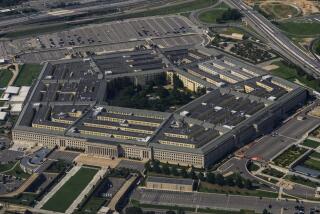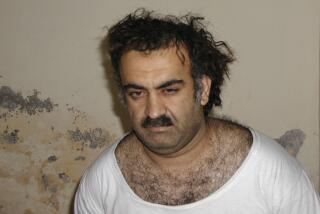Two More at Guantanamo Getting Lawyers
- Share via
WASHINGTON — The Pentagon is scheduled to assign defense lawyers to two more terrorism suspects held at a U.S. base in Cuba and may modify rules allowing the monitoring of conversations between defense attorneys and defendants tried before military tribunals, officials said Thursday.
The Defense Department also released about nine minutes of video showing some of the roughly 650 men imprisoned at the Guantanamo Bay naval base, showing what one official called the “humane conditions” in which they were held.
Another official, speaking on condition of anonymity, said the Pentagon would name military attorneys to represent two more of the six men whom President Bush last July deemed eligible for trial before U.S. military tribunals.
Officials did not reveal the names or nationalities of the two men, but said they were not considered well-known suspects. They would bring to four the number of Guantanamo prisoners with military defense counsel. Previously, Lt. Cmdr. Charles Swift was named to defend Yemeni prisoner Salim Ahmen Hamdan, and Maj. Michael Mori was assigned to defend Australian David Hicks.
In November 2001 Bush authorized trials before tribunals of American military officers, formally called commissions, of non-U.S. citizens captured in what he calls the global war on terrorism.
None of the suspects at Guantanamo Bay has been charged with any crime, and critics decry their situation as being “a legal black hole.”
Human rights groups and others, including Mori and Swift, have criticized rules created for the trials by the Pentagon.
Critics argue the system is rigged to produce convictions, noting that the Pentagon has complete control over the process and that there is no independent judicial review.
One of the most criticized rules is one allowing the government to monitor conversations between defendants and their lawyers.
An official said the monitoring of conversations would continue but that the rules might be altered to give defense lawyers notice of when the eavesdropping would occur and allow the attorney to inform the defendant about the monitoring.
The Pentagon calls the monitoring necessary for intelligence gathering and security.
More to Read
Sign up for Essential California
The most important California stories and recommendations in your inbox every morning.
You may occasionally receive promotional content from the Los Angeles Times.













